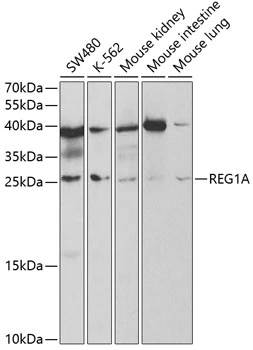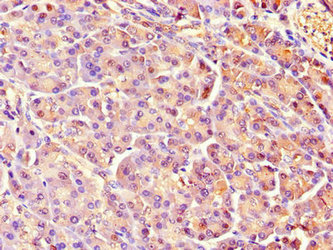
WB analysis of various sample lysates using GTX66464 REG1A antibody. Dilution : 1:1000 Loading : 25μg per lane
REG1A antibody
GTX66464
ApplicationsWestern Blot
Product group Antibodies
ReactivityHuman, Mouse
TargetREG1A
Overview
- SupplierGeneTex
- Product NameREG1A antibody
- Delivery Days Customer9
- Application Supplier NoteWB: 1:500 - 1:2000. *Optimal dilutions/concentrations should be determined by the researcher.Not tested in other applications.
- ApplicationsWestern Blot
- CertificationResearch Use Only
- ClonalityPolyclonal
- ConjugateUnconjugated
- Gene ID5967
- Target nameREG1A
- Target descriptionregenerating family member 1 alpha
- Target synonymsICRF, P19, PSP, PSPS, PSPS1, PTP, REG, lithostathine-1-alpha, REG-1-alpha, islet cells regeneration factor, islet of langerhans regenerating protein, pancreatic stone protein, secretory, pancreatic thread protein, protein-X, regenerating islet-derived protein 1-alpha, regenerating protein I alpha
- HostRabbit
- IsotypeIgG
- Protein IDP05451
- Protein NameLithostathine-1-alpha
- Scientific DescriptionThis gene is a type I subclass member of the Reg gene family. The Reg gene family is a multigene family grouped into four subclasses, types I, II, III and IV, based on the primary structures of the encoded proteins. This gene encodes a protein that is secreted by the exocrine pancreas. It is associated with islet cell regeneration and diabetogenesis and may be involved in pancreatic lithogenesis. Reg family members REG1B, REGL, PAP and this gene are tandemly clustered on chromosome 2p12 and may have arisen from the same ancestral gene by gene duplication. [provided by RefSeq, Jul 2008]
- ReactivityHuman, Mouse
- Storage Instruction-20°C or -80°C,2°C to 8°C
- UNSPSC41116161






![IHC-P analysis of human Pancreas tissue using GTX83376 REG1A antibody [1A4].](https://www.genetex.com/upload/website/prouct_img/normal/GTX83376/GTX83376_20170912_IHC-P_w_23061322_771.webp)
